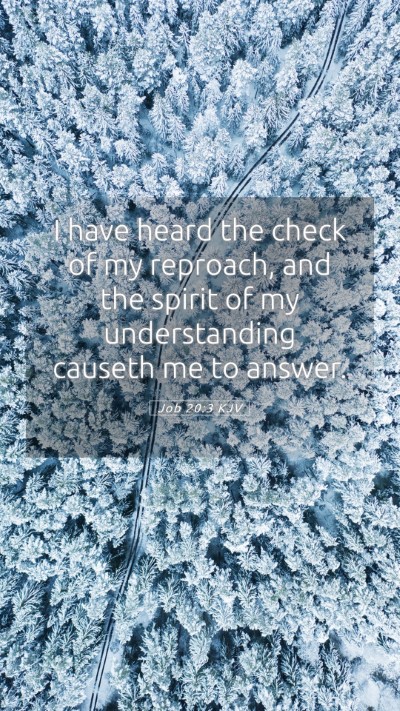Old Testament
Genesis Exodus Leviticus Numbers Deuteronomy Joshua Judges Ruth 1 Samuel 2 Samuel 1 Kings 2 Kings 1 Chronicles 2 Chronicles Ezra Nehemiah Esther Job Psalms Proverbs Ecclesiastes Song of Solomon Isaiah Jeremiah Lamentations Ezekiel Daniel Hosea Joel Amos Obadiah Jonah Micah Nahum Habakkuk Zephaniah Haggai Zechariah MalachiJob 20:3 Meaning
What is the meaning of Job 20:3?
I have heard the check of my reproach, and the spirit of my understanding causeth me to answer.
Job 20:3 Bible Verse Meaning
Understanding Job 20:3 - Bible Verse Commentary
The verse Job 20:3 states:
"I hear a voice that signals the warning, the insight rolls like thunder in my heart."
Overview of Job 20:3
This verse comes from a passage where Zophar, one of Job's friends, speaks after Job has lamented his suffering. Zophar's words reflect the general human struggle of reconciling suffering with divine justice. Understanding this verse involves examining the context in which it is spoken, the character of Zophar, and the broader theological implications.
Commentary Insights
-
Matthew Henry's Commentary
Henry emphasizes that Zophar responds to Job's assertions regarding his innocence by asserting that God's judgment is inevitable. The tone of Zophar's remarks indicates that he believes humans cannot understand the depths of God's wisdom, especially concerning justice and punishment.
-
Albert Barnes' Notes
Barnes interprets this verse as Zophar demonstrating a prophetic or divine inspiration when he speaks. He acknowledges his own need to communicate the truths he feels compelled to convey, reflecting the urgency of divine communication to human beings, especially in times of distress.
-
Adam Clarke's Commentary
Clarke suggests that the "voice" represents the inner conviction that often accompanies speaking truth. He underscores the significance of the message, asserting that Zophar is not merely sharing his thoughts but relaying what he perceives as divinely imparted wisdom concerning Job's situation.
Thematic Analysis
The examination of Job 20:3 invites profound questions related to:
- The nature of suffering: Zophar's voice symbolizes those elements of life and faith that confront us in trials.
- The roles of friends and community: Zophar’s attempt to encourage Job also reveals how friends can misinterpret each other's struggles.
- The mystery of divine judgment: The verse implies a deeper understanding of God’s decisions, indicating that they are often beyond human comprehension.
Historical Context
In the book of Job, the dialogues between Job and his friends provide a platform for grappling with the complexities of God's justice. The interactions also illustrate the social norms of the ancient Near East regarding respect for wisdom and the expected comportment of friends during a time of suffering.
Applications of Job 20:3
When applying Job 20:3 to daily life, consider the following:
- Reflect on personal suffering and the ways it can enhance understanding rather than detract from faith.
- Understand the role of community: how friends can support or hinder one another in times of distress.
- Seek divine insight during difficult times, recognizing that God may communicate wisdom in silent or profound ways.
Cross References
This verse can be related to:
- Job 4:7-8: Eliphaz's assertion that the innocent do not suffer.
- Job 5:17-18: A reminder of the need to endure suffering as a part of God’s plan.
- James 5:11: An encouragement for believers to consider the patience of Job as a model of perseverance.
Conclusion
In conclusion, Job 20:3 challenges readers to consider the weight of divine judgment, the role of suffering in spiritual growth, and our responsibilities to one another as part of a community of faith. Scripture analysis invites us to engage deeply with the text while gaining biblical exegesis for our own lives.


